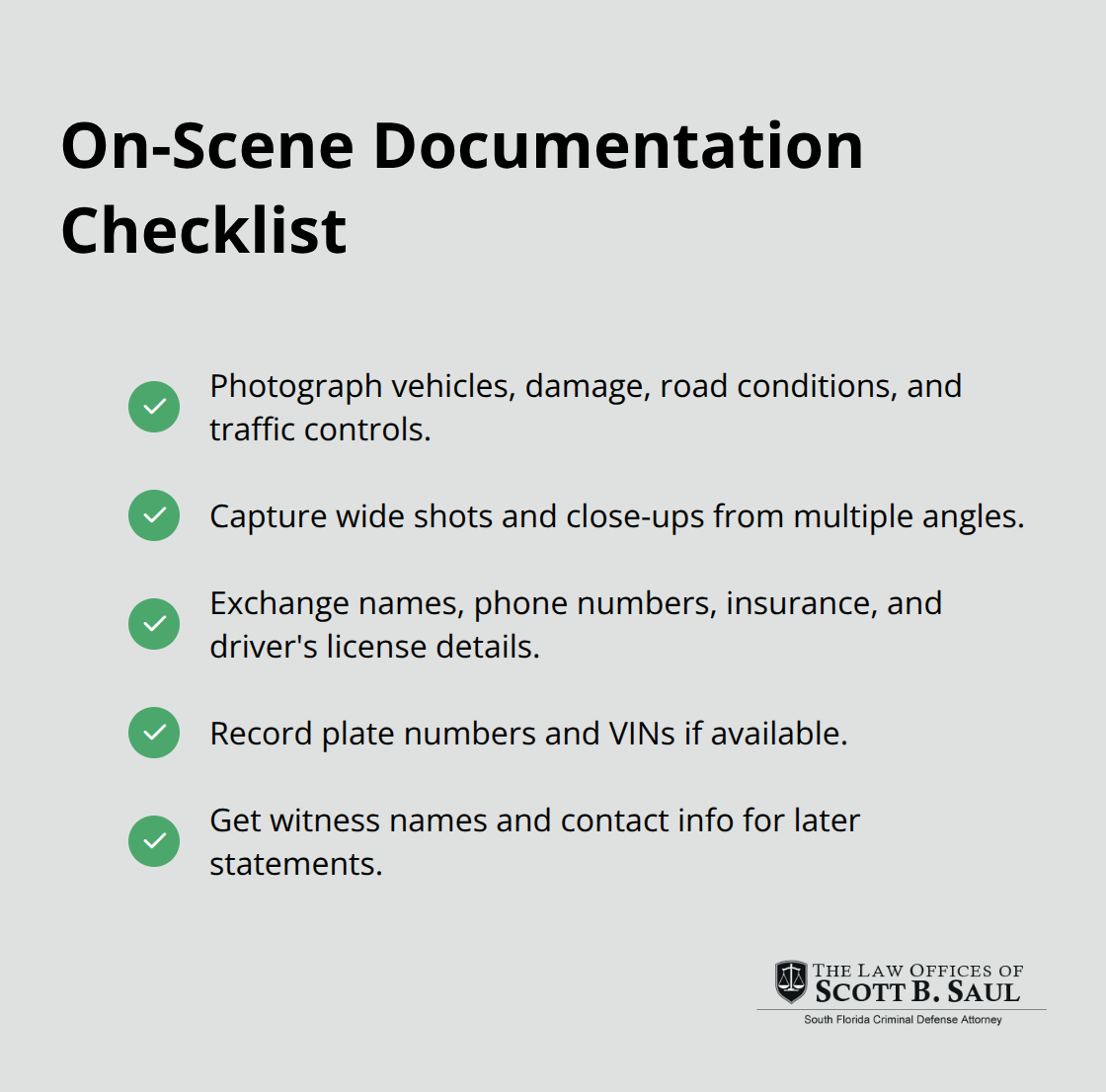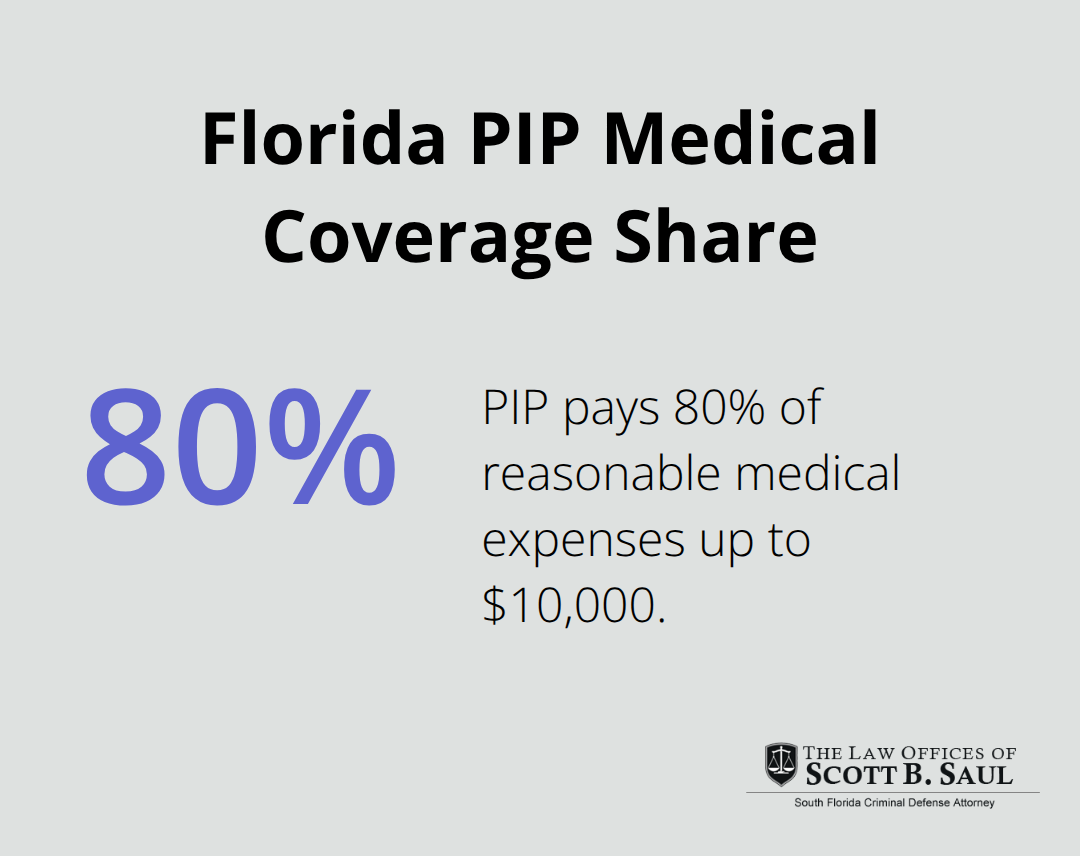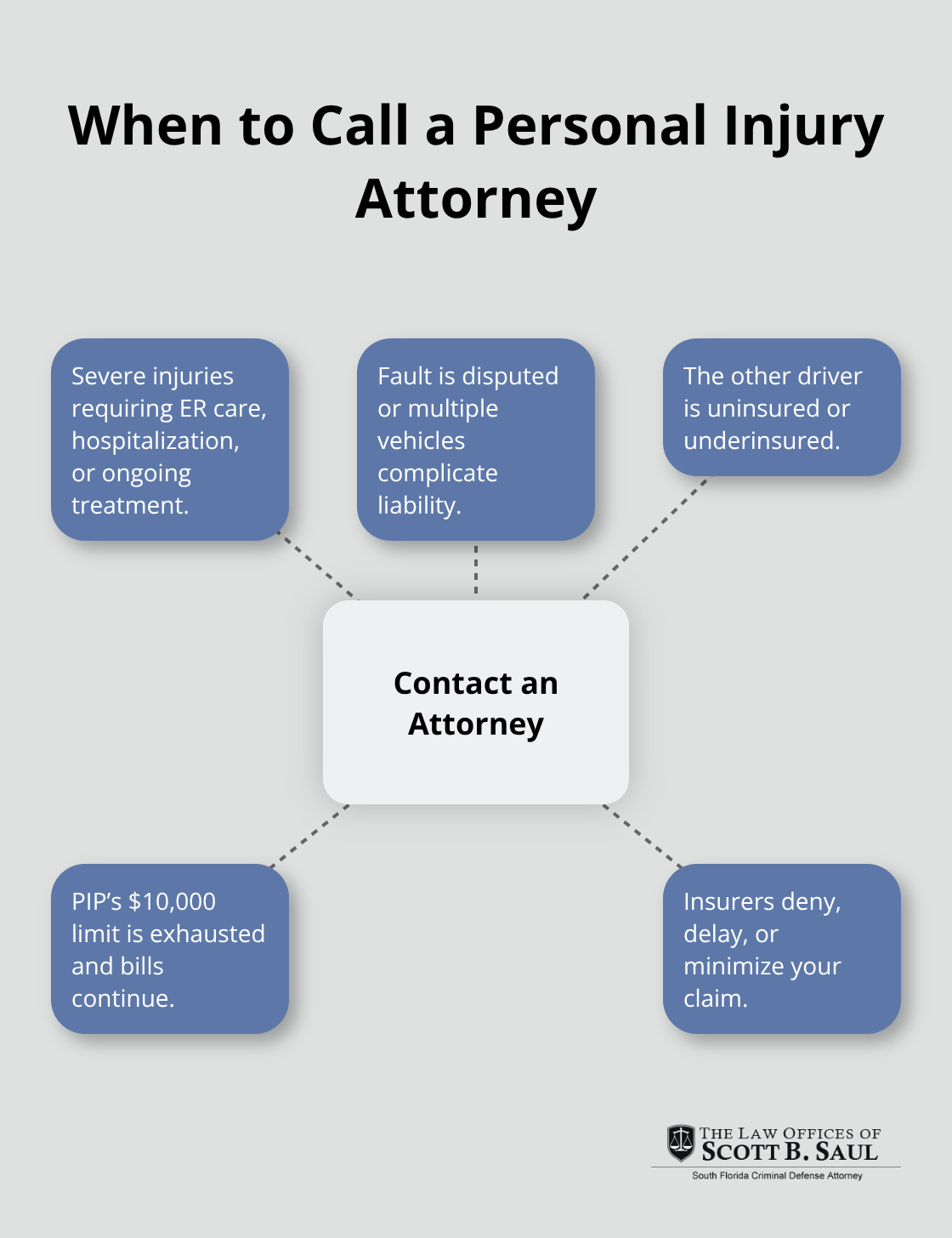What to Do After a Car Accident in Florida A Step-by-Step Guide
By : saulcrim | Category : Criminal Defense | Comments Off on What to Do After a Car Accident in Florida A Step-by-Step Guide
3rd Nov 2025

Car accidents happen in seconds, but the decisions you make afterward can impact your life for years. Florida’s unique insurance laws and legal requirements make knowing what to do after a car accident in Florida absolutely essential.
We at Law Offices of Scott B. Saul have guided countless clients through this process. This step-by-step guide will help you protect your rights and navigate the aftermath effectively.
What Should You Do First at the Scene?
Check for Injuries and Contact Emergency Services
Your first priority after any car accident must be to check for injuries among all parties involved. Florida recorded over 400,000 traffic crashes in 2022. If anyone appears hurt or complains of pain, call 911 immediately. Florida law under Section 316.065 requires you to contact local law enforcement for crashes involving injury, death, or property damage. Even seemingly minor injuries can worsen within hours, which makes immediate medical evaluation essential for both health and insurance purposes.
Secure the Scene and Protect Everyone
After you address injuries, move vehicles out of traffic lanes if they can be driven safely, then activate hazard lights on all vehicles. This step protects everyone from additional accidents and allows traffic to flow around the scene. Position yourself and others away from moving traffic while you wait for help to arrive.
Document Everything at the Scene
Take photographs from multiple angles that show vehicle damage, the accident scene, license plates, and any traffic signs or signals. Florida’s no-fault insurance system means your documentation will be vital for claims processing. Collect names, phone numbers, insurance information, and driver’s license numbers from all drivers involved. Gather contact information from witnesses, as their statements can prove invaluable if disputes arise later.

Prepare for the Next Steps
The Florida Department of Highway Safety and Motor Vehicles reports that proper documentation at the scene significantly improves claim resolution times and reduces disputes between insurance companies. Once you complete these immediate steps, you’ll need to focus on the legal requirements and insurance obligations that follow every Florida accident.
How Do You Handle Insurance and Legal Requirements?
Contact Your Insurance Company Immediately
Florida law demands swift action after any car accident. You must report the incident to your insurance company within 24 hours, regardless of fault. Most insurers provide 24/7 claim reporting hotlines specifically for this purpose. Delays in notification can jeopardize your coverage and create complications during the claims process. The Florida Department of Highway Safety and Motor Vehicles emphasizes that prompt reports significantly reduce claim disputes and accelerate resolution times.
Navigate Florida’s No-Fault Insurance System
Florida operates under a no-fault insurance system that requires all drivers to carry Personal Injury Protection coverage with minimum limits of $10,000. This PIP coverage pays 80 percent of your medical expenses up to $10,000 regardless of who caused the accident. You must seek medical treatment within 14 days to remain eligible for PIP benefits. The 14-day window is absolutely essential for protection of your financial interests.

Your insurance company will coordinate directly with healthcare providers to handle medical bills up to your policy limits.
File Required Police Reports
Florida law under Section 316.065 mandates police reports for accidents that involve injury, death, or property damage that exceeds $500. If law enforcement does not respond to minor crashes, you must complete a Driver Report of Traffic Crash form available through the Florida Department of Highway Safety and Motor Vehicles website. Submit this self-report online or mail the completed form to avoid penalties. Crash reports become available for purchase through the Florida Crash Portal providing essential documentation for insurance claims and potential legal proceedings.
These insurance and legal steps protect your immediate interests, but certain situations require additional professional guidance to maximize your recovery and protect your long-term rights.
When Should You Contact a Personal Injury Attorney
Severe Injuries and Disputed Fault Require Professional Help
Contact an attorney immediately if you suffered serious injuries that required emergency room treatment, hospitalization, or ongoing medical care. Florida’s PIP coverage only provides $10,000 maximum, which gets exhausted quickly with major injuries. The Insurance Research Council found that accident victims who hire attorneys receive settlements that are 3.5 times higher than those who handle claims alone.

You also need legal representation when fault is disputed, multiple vehicles are involved, or the other driver was uninsured. Insurance companies routinely deny or minimize claims, especially when significant money is at stake.
Maximizing Compensation Beyond PIP Limits
An experienced attorney can pursue compensation beyond your PIP coverage through the at-fault driver’s liability insurance. Florida allows you to recover damages for pain and suffering if your injuries meet the serious injury threshold under Section 627.737 of Florida Statutes.
Personal injury attorneys understand how insurance companies operate and can build winning cases against their tactics. They know which evidence proves most valuable and how to present it effectively.
What to Expect During Your Initial Consultation
During your initial consultation, expect a thorough review of your medical records, accident scene photos, and police reports. The attorney will calculate potential damages (including medical expenses, lost wages, future treatment costs, and pain and suffering). Most personal injury attorneys work on contingency fees, meaning you pay nothing unless they win your case.
The consultation typically lasts 30-60 minutes and covers the strength of your case, potential compensation amounts, and timeline for resolution. Attorneys will also explain Florida’s statute of limitations, which gives you four years to file a personal injury claim after most car accidents.
Final Thoughts
The steps you take after a car accident in Florida directly determine your ability to recover compensation and protect your legal rights. Quick action on medical treatment, insurance notification, and proper documentation creates the foundation for successful claims. Florida’s 14-day medical treatment window for PIP benefits passes quickly, and evidence disappears while insurance companies build defenses against your claim.
Professional legal representation becomes essential when serious injuries occur or when fault gets disputed. We at Law Offices of Scott B. Saul understand how to navigate Florida’s complex insurance laws and have successfully handled numerous jury cases. Our team knows how insurance companies operate and can build strong cases against their tactics.
Time works against accident victims in every Florida car crash case. Witnesses forget details, medical records become harder to obtain, and insurance adjusters pressure victims into quick settlements. Contact our experienced legal team today to protect your rights and secure the compensation you deserve.
Archives
- November 2025 (1)
- October 2025 (8)
- September 2025 (9)
- August 2025 (8)
- July 2025 (8)
- June 2025 (9)
- May 2025 (9)
- April 2025 (8)
- March 2025 (9)
- February 2025 (8)
- January 2025 (9)
- December 2024 (10)
- November 2024 (5)
- July 2024 (2)
- June 2024 (2)
- May 2024 (2)
- April 2024 (2)
- March 2024 (2)
- February 2024 (2)
- January 2024 (2)
- December 2023 (2)
- November 2023 (2)
- October 2023 (2)
- September 2023 (2)
- August 2023 (1)
- July 2023 (2)
- June 2023 (2)
- May 2023 (2)
- April 2023 (2)
- March 2023 (2)
- February 2023 (2)
- January 2023 (2)
- December 2022 (2)
- November 2022 (2)
- October 2022 (2)
- September 2022 (2)
- August 2022 (2)
- July 2022 (2)
- June 2022 (2)
- May 2022 (2)
- April 2022 (2)
- March 2022 (2)
- February 2022 (2)
- January 2022 (2)
- December 2021 (2)
- November 2021 (2)
- October 2021 (2)
- September 2021 (2)
- August 2021 (2)
- July 2021 (2)
- June 2021 (2)
- May 2021 (2)
- April 2021 (2)
- September 2020 (5)
- July 2020 (4)
- June 2020 (4)
- May 2020 (4)
- April 2020 (5)
- March 2020 (4)
- February 2020 (4)
- January 2020 (4)
- December 2019 (1)
- November 2019 (4)
- October 2019 (4)
- September 2019 (4)
- August 2019 (4)
- July 2019 (5)
- June 2019 (4)
- May 2019 (4)
- April 2019 (4)
- March 2019 (4)
- February 2019 (4)
- January 2019 (4)
- December 2018 (4)
- November 2018 (5)
- October 2018 (5)
- September 2018 (4)
- August 2018 (4)
- July 2018 (7)
- June 2018 (4)
- May 2018 (4)
- April 2018 (8)
- March 2018 (4)
- February 2018 (4)
- January 2018 (4)
- November 2017 (4)
- October 2017 (4)
- September 2017 (4)
- August 2017 (7)
- July 2017 (6)
- June 2017 (4)
- May 2017 (4)
- April 2017 (4)
- March 2017 (4)
- February 2017 (7)
- January 2017 (4)
- December 2016 (7)
- November 2016 (4)
- October 2016 (4)
- September 2016 (10)
- August 2016 (4)
- July 2016 (4)
- June 2016 (4)
- May 2016 (4)
- April 2016 (4)
- March 2016 (4)
- February 2016 (7)
- January 2016 (4)
- December 2015 (5)
- November 2015 (4)
- October 2015 (7)
- September 2015 (4)
- August 2015 (4)
- July 2015 (13)
- June 2015 (9)
- May 2015 (8)
- April 2015 (6)
- March 2015 (4)
- February 2015 (4)
- January 2015 (4)
- December 2014 (4)
- November 2014 (4)
- October 2014 (4)
- September 2014 (3)
Categories
- Adjudication (1)
- Bankruptcy (1)
- Burglary Crimes (3)
- calendar call (1)
- Car Accident (1)
- Criminal Defense (365)
- Cyber Crimes (7)
- DNA (1)
- Domestic Violence (9)
- Drug Crimes (5)
- DUI (12)
- Embezzlement (1)
- Environmental Crimes (4)
- Expungement Law (2)
- Federal Sentencing Law (3)
- Firearm (3)
- Forgery (4)
- General (82)
- Healthcare (3)
- Immigration (1)
- Indentity Theft (1)
- Insurance (5)
- judicial sounding (2)
- Juvenile Crimes (4)
- Manslaughter (4)
- Money Laundering (3)
- Organized Crime (1)
- Racketeering (1)
- Reckless Driving (3)
- RICO (3)
- Sealing and Expunging (2)
- Sex Offense (1)
- Shoplifting (1)
- Suspended Driver's License (1)
- Traffic (4)
- Trending Topics (1)
- White-collar Offenses (1)

